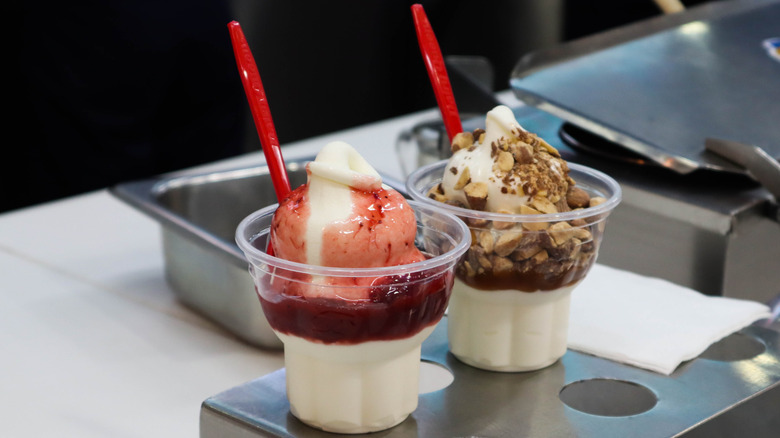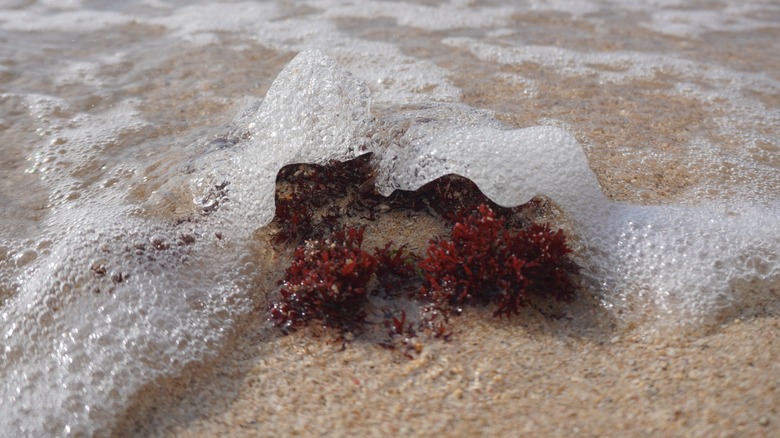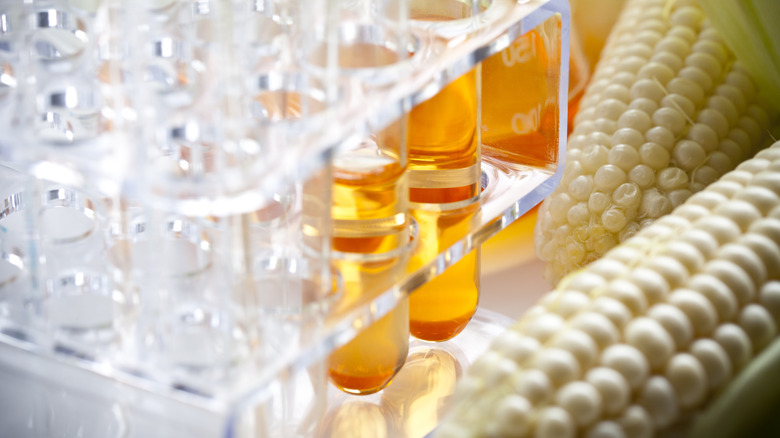Dairy Queen's Soft Serve Isn't What You Think It Is
Has it ever occurred to you that Dairy Queen, renowned for its hot eats and cool treats does not refer to its ice cream as, well, ice cream? This is because, per the U.S. government, it's not really ice cream. According to regulations set forth by the Food and Drug Administration, ice cream must contain at least 10% milkfat, and DQ's soft serve only contains 5%.
So while it has all the characteristics of ice cream — it's thick and creamy, richly flavored, and served up ice cold (at 18 degrees, to be exact) — DQ isn't legally able to call it such. Thus, the chain settled on "soft serve." Its listed ingredients include: milkfat and nonfat milk, sugar, corn syrup, whey, mono and diglycerides, artificial flavor, guar gum, polysorbate 80, carrageenan, and vitamin A palmitate.
As you can see, there are a lot more ingredients in DQ's soft serve than you might expect, and you may have heard of some of them in a negative context. As it happens, everything that goes into DQ's soft serve is FDA-approved, though you wouldn't be remiss if you wanted to dig a little deeper into the contents of your next chilled treat.
What's up with the carrageenan?
You might be dismayed to see carrageenan on the list of ingredients for Dairy Queen's soft serve. Carrageenan is an additive that helps foods thicken or gel. It's derived from naturally occurring red seaweed, which itself has served as an ingredient in cooking for centuries.
Carrageenan gained its controversial status after a report in the journal Environmental Health Perspectives in 2001 stated that the additive was linked to negative gastrointestinal effects in tested animals. The report's author, J.K. Tobacman, suggested that carrageenan could possibly have a carcinogenic effect. Despite a 2002 study in Critical Reviews in Toxicology that contradicted Tobacman's conclusions, carrageenan's reputation was tarnished in the court of public opinion, and that reputation has persisted.
Carrageenan is not, in fact, harmful to the majority of people; however, those with existing gastrointestinal issues might want to limit how much DQ soft serve they ingest. They could also experiment with it by eating only "safe" foods for a day, with the exception of a DQ soft serve dessert, to see if it bothers them in isolation.
Other ingredients that might give you pause
Carrageenan isn't the only additive in Dairy Queen's soft serve. There's polysorbate 80, which is used as an emulsifier, as well as an anti-melting agent. Mono and diglycerides work in conjunction with polysorbate 80, also as emulsifiers. Then there's corn syrup, a liquid additive derived from corn which adds sweetness to foods; it contains glucose, a type of sugar, and has been linked to high blood pressure and type 2 diabetes. Corn syrup is put in soft serve not just for its sweet flavor, but because it aids with texture and helps keep the soft serve from crystallizing while it sits in freezers. Experts recommend no more than 50 grams of corn syrup per day.
Vitamin A palmitate (also known as retinyl palmitate) is used in low-fat milk products — which DQ's soft serve is — to replace some of the vitamins lost while making the food low-fat. Guar gum works alongside the carrageenan to thicken and emulsify the soft serve. Finally, while it is difficult to pierce the veil of the vaguely worded "artificial flavors," you can rest assured that they are FDA-approved (or DQ would be in serious trouble — much like it was when some Dairy Queen locations in Indiana and Michigan violated child labor laws).


